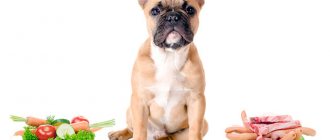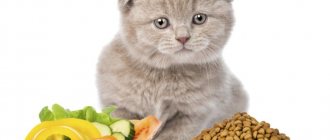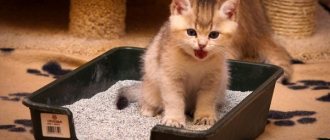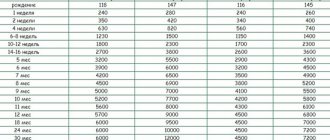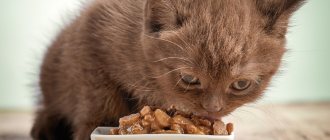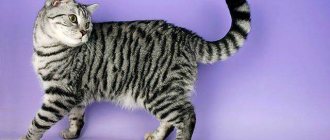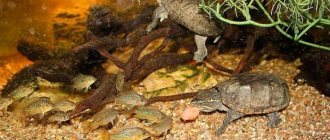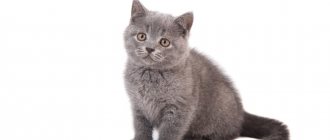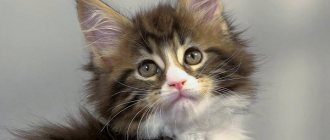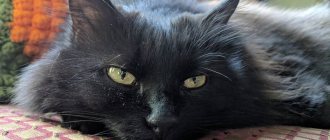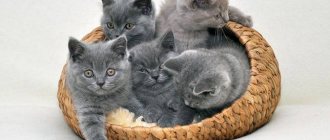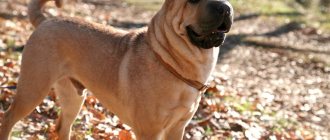The main role in feeding kittens up to 1 month is performed by the cat; complementary feeding begins at 3–4 weeks. It is better to use ceramic and glass dishes for food and water. Plates should be kept clean, water (purified, filtered or boiled) and fresh (changed a couple of times a day), food should be at room temperature.
What to feed correctly: food or natural food at home, depends on the type of feeding the kittens chosen by the breeder: natural, dry food or a mixed type of food.
Natural feeding of the British
The presented list of products in the table is in addition to cat milk; kittens feed on cat milk for up to 2 - 3 months.
| Age | How and what natural foods can you feed a British kitten? | Number of feedings per week |
| 1, 2, 3, 4 months | minced beef, then finely chopped beef, cut into strips 0.5 - 1 cm thick, 3 - 5 cm long, freeze for 24 hours. | daily |
| quail eggs (can be beaten with cream), egg yolk | 2 – 3 | |
| dairy products (kefir, sour cream, cottage cheese without additives, cream, all with medium fat content) | 2 – 3 | |
| boiled chicken, turkey, rabbit are mixed with boiled porridges (buckwheat, oatmeal, rice, wheat), vegetables (carrots, zucchini, pumpkin, cabbage), proportions 2:1 with the addition of vegetable oil | 1 – 2 | |
| special sprouted grass | daily | |
| vitamins 8 in 1, Beaphar | daily | |
| from 5 – 6 months | We feed in the same way as up to 4 months, increasing the serving rate. Do not give milk (may not be digested). |
What not to feed a kitten:
- duck, pork, any bones, goose, lamb;
- potatoes, legumes;
- dried, salted, fried, smoked, spices, spicy, sweet;
- River fish;
- egg white;
- onion garlic;
- street grass.
Natural food for British breed kittens
You can “put” your cat on a purely natural diet from an early age, but in this case you cannot do without special vitamin complexes that contain the necessary microelements for the correct balance and harmonious development of the young animal. Either an experienced breeder or a veterinarian will tell you in detail about such additives. But in any case, you will have to purchase them if you want to raise a healthy and strong cat.
What can little Britons be given as natural food? Firstly, these thoroughbred descendants of wild predators happily eat boiled lean meats. It is permissible to offer them raw beef, but only after preliminary freezing. It is very convenient to divide freshly prepared minced meat into single portions (about thirty grams each) and put them in the freezer for three days.
An hour before feeding, one such ball should be removed, allowed to thaw and reach room temperature. Kittens should not receive hot or very cold food. But it is better to exclude raw chicken and turkey from the diet of these aristocrats.
Experts recommend giving British children cottage cheese with a drop of low-fat sour cream, kefir and fermented baked milk at least twice a week. You can sometimes feed them quail eggs. Porridge is good for babies. By the way, babies up to three months old should be given semolina, oatmeal and rice with milk. Many breeders do not mind a small amount of fish in the diet of small kittens and adolescents. It is harmful to castrated and sterilized animals due to excess phosphorus content. But a little boiled salmon or cod exclusively as a delicacy will benefit the young body. It is better to exclude river fish from the diet altogether due to the abundance of bones.
Everyone knows that a purebred cat is particularly selective in food. The British are no exception and are capable of showing obstinacy from the first months of eating homemade food. For example, they may flatly refuse to eat porridge. In this case, do not rush to apply the principle “If you get hungry, eat!” After all, any children, even cats, can be outwitted.
Mix the much-unloved buckwheat or rice with finely chopped or minced boiled meat and add vitamin B. In this form, kittens will be very happy to deal with the offered food, which previously caused them dissatisfaction.
The same technique can be applied to the cooked vegetables that Brits are expected to eat every day. Frozen spinach, kohlrabi, carrots and cauliflower are all very healthy for a growing body, but how do you get your cat to eat these foods? Again, mixing them with meat. As a source of natural protein, start giving your British baby shrimp and shells as early as six months of age. Just cut the seafood into pieces, and you won’t be able to drag your pet away from the bowl by the ears.
Offer your British kitten half a boiled chicken yolk no more than once or twice a week. It can be ground with kefir. Offal is a good addition to the main diet. Beef liver, heart and lungs are suitable for consumption raw, but only after preliminary freezing. But the same entrails, but from chicken, should be given exclusively boiled. British kittens can receive offal two to three times a week.
Dry and wet food, canned food
It is important to choose the best food Premium, Superpremium, Holistic. The best foods are Orijen, Acana, Optima Nova.
| Age | What food is best to feed a British kitten? | Number of feedings per week |
| 3 – 5 weeks | canned food, wet food for kittens | daily |
| cat milk, special milk | daily up to 3 months | |
| from 5 – 12 months | canned food, spiders for kittens | 3 – 4 |
| dry food for kittens (can be soaked a little if the instructions allow it) | every day | |
| special sprouted grass | daily | |
| vitamins 8 in 1, Beaphar | course | |
| dry food for adults or sterilized | daily | |
| after 12 months | canned food, wet food (pouches) for adults or sterilized | 3 – 4 |
| special sprouted grass | daily | |
| vitamins for cats 8 in 1, Beaphar | course |
Dry, wet food and canned food must be the same brand! Canned food is transferred from metal containers to glass containers with a lid; they are stored in the refrigerator for no more than 24 hours!
It is better to buy drying in packages of no more than 5 kg. You need to get a special glass or ceramic jar (half - 1 liter) with a tight-fitting lid. Pour food into it (squeeze the air out of the bag before closing). Store the jar in a dry, dark place.
What food should you not feed your kitten:
- cheap “Kitekat”, “Friskies”, “Whiskas” and from the same series will lead to illness and quick death of your pet,
- drying by weight (in most pet stores, bags of food are kept in an open form, as a result it erodes, its beneficial properties disappear, taste and color change, fats become “washed out” in the air, carcinogenic substances appear in the food. It is impossible to track when the bag is opened, what is the expiration date and is there another one mixed in).
What to feed kittens after poisoning?
Naturally, after any poisoning, the pet’s diet changes slightly. If a small kitten is poisoned, you should prepare food for it that will help restore its condition.
To do this, boil the chicken breast and cut it into small pieces, then cook the rice (no need to add salt). You can boil any lean porridge. Don't make it fat! You don't have to add any oil at all!
Portions should be reduced or divided into fractional meals. If the kitten does not want to eat such food, you can try giving him chicken puree from the baby food series. Even after poisoning, chicken yolk is good.
If your pet is experiencing diarrhea, then any amount of starch and carbohydrates should be excluded from its diet. And, of course, you should not give your kitten any fermented milk products!
And, conversely, if your pet is constipated, then you should give him a little kefir or yogurt. Vegetables are also good. They can be boiled and finely chopped. If the animal refuses to eat them, then try mixing vegetables with a small amount of meat. You can also try replacing this dish with baby vegetable food.
Mixed feeding
There are two options:
- Drying + natural. With this type of feeding, the cat is always dry. A supplement to it is natural complementary feeding (1-2 times/day) + vitamins.
This type of feeding is contraindicated by veterinarians because it often leads to urolithiasis (UKD), hyperthyroidism, gastrointestinal problems, etc.
- Drying + canned food or wet food. With this type of feeding, drying is mixed with complete canned food.
This type of feeding is recommended by veterinarians because... the food is balanced and fermented for better absorption, tasty for the pet and will help replenish the lack of water in the body if the cat drinks little.
Dry food or natural food, what to choose
Natural food is as close as possible to the cat’s natural diet, you know what you are feeding, it’s appetizing for your pet, it contains a sufficient amount of moisture, and it provides the proper load on the teeth. It is very difficult to properly balance the diet, the need for vitamins, and a lot of time spent on preparation.
When feeding dry food, the diet is balanced, the time required is minimal, and does not require daily vitamins. Good dry food is expensive, has low moisture content, is light on the teeth, and may not be appetizing in appearance.
When feeding canned food and wet food, the diet is balanced, the time required is minimal, does not require daily vitamins, contains a sufficient amount of moisture, and is appetizing to the animal. Canned food and wet food are very expensive and put little strain on the teeth.
Industrial food
There is no clear opinion among veterinarians and felinologists regarding which food is more beneficial for kittens - natural products or industrial food. Dry and wet food are not natural for animals. But they contain all the necessary mineral components and vitamins. The composition is an ideal balance of proteins, fats and carbohydrates, but only on the condition that high-quality, expensive varieties of industrial food are selected.
Rules for feeding industrial products:
- It is strictly forbidden to mix store-bought cat food and natural products. This is very harmful for the animal.
- It is recommended to choose food from only one manufacturer and not change it.
- Maintain drinking regime. Dry food contains virtually no moisture necessary for the kitten’s body. If your pet only eats dry food, you need to make sure that he drinks at least 200 ml of water per day. Failure to comply with this rule will lead to the development of serious complications. There is a risk of developing urolithiasis and other digestive problems. The water should always be clean and should be changed 2 times a day. If food particles get into the liquid, it must be changed immediately. Kittens will not drink dirty water.
- When choosing food, you should focus on the age for which it is suitable. You cannot give a 3-month-old kitten food intended for adult animals.
Categories of industrial rations. There are several classes of ready-made food:
- Holistics are the highest quality food, but also the most expensive. It can be given to a kitten only if the owner is sure that he can always provide such nutrition to the pet. It is not recommended to switch an animal from expensive food to a budget option. Holistics are foods containing natural products. The source of protein is natural, lean meat. The composition also contains vegetables and grains, vitamins and minerals.
- Super-premium - food is somewhat cheaper than holistic food, but of fairly high quality. The composition contains natural products: meat, vegetables and grains, fruits. The composition is absolutely balanced.
- Premium is a good product at a reasonable price. The optimal feeding option if it is not possible to give your pet holistic nutrition. But it may contain products that cause allergies. Therefore, before buying food for a kitten with intolerance to certain foods, you should carefully study the composition.
- Economy - Whiskas, Friskas, etc. Such feeds have only one advantage - low price. Contains few natural products. Cereals are the source of protein. These products contain harmful food additives that enhance the taste of the food and make it very attractive to animals. But constant feeding of such a diet is fraught with high risks of developing diseases of the digestive system in the future (read the article: Is it possible to feed a cat Whiskas).
The best manufacturing companies. For kittens aged 3 months, veterinarians recommend choosing food from well-known manufacturers:
- Acana is a premium class of high quality, time-tested. The composition is completely balanced, developed according to the needs of a growing organism. This is a hypoallergenic food and can be safely given to kittens who are prone to food allergies. A special feature is the production of food in its own juice. The composition is represented by natural meat, vegetables and fruits, cereals, seaweed and eggs.
- Royal Canin - brand dry food is considered one of the best natural food substitutes. Contains beneficial and nutritious ingredients. Have a ruler. This brand of food is recommended to be given to kittens that have some health problems.
Portion size
When feeding your pet with industrial food, it is important to strictly follow the dosages recommended by the manufacturer and indicated on the food packaging. Wet food comes in hermetically sealed bags
1 package is for 1 meal. But for kittens at 3 months, the amount of food from the bag must be divided. At this age, babies cannot yet measure the amount of food needed to satisfy them and may overeat.
- kitten weight by month;
- what to feed a kitten at 4 months;
- review of cat treats.
How many times a day to feed
An adult cat is fed 3 - 4 times a day, we monitor the weight gain of a pregnant cat (we reduce the amount of food 1 - 1.5 weeks before giving birth).
A British cat should gain 1000 - 1500 grams during pregnancy; more is dangerous, because... the kittens will be large, which will lead to a difficult birth. The nursing mother should not be limited in food, she will eat as much as she needs, the norm should be introduced when the cat stops feeding.
Feeding kittens:
- 3 – 4 weeks (monthly) – 1 time/day;
- 1 – 2 months – 2 times/day;
- 2 – 3 months – 3 times/day;
- 3 – 12 months – main feeding 3 – 4 times a day.
The norm in grams for dry food is indicated on the packaging depending on the weight and age of the pet.
The diet of a sterilized British cat or neutered cat is the same as that of a regular cat. Such animals are more likely to be overweight. If a cat (no matter what breed: British or Scottish Fold or Straight) has gained excess weight, it should be gradually transferred to a special food for sterilized ones.
Daily intake of Optima Nova kitten
The choice is up to the owner
Next, the owner can choose whether to continue feeding natural meat or switch to store-bought food. If you decide to stick to a natural diet, it should be based on boiled meat: beef, veal, chicken, turkey.
If your pets enjoyed eating vegetables and cereals as children, you can leave them on the menu. If predators did not want to eat it, then these products can be excluded and replaced with special cat grass. Don’t forget: the animal definitely needs fiber to digest large amounts of meat food. You can also feed your pet special food with grass.
If you decide to feed your British cat food, then choose only high-quality dry food , granular food or even special canned cat food. Such food products are sold in veterinary pharmacies and pet stores. They are very healthy and contain an optimal set of microelements, which is why even some veterinarians recommend feeding pets with these foods.
